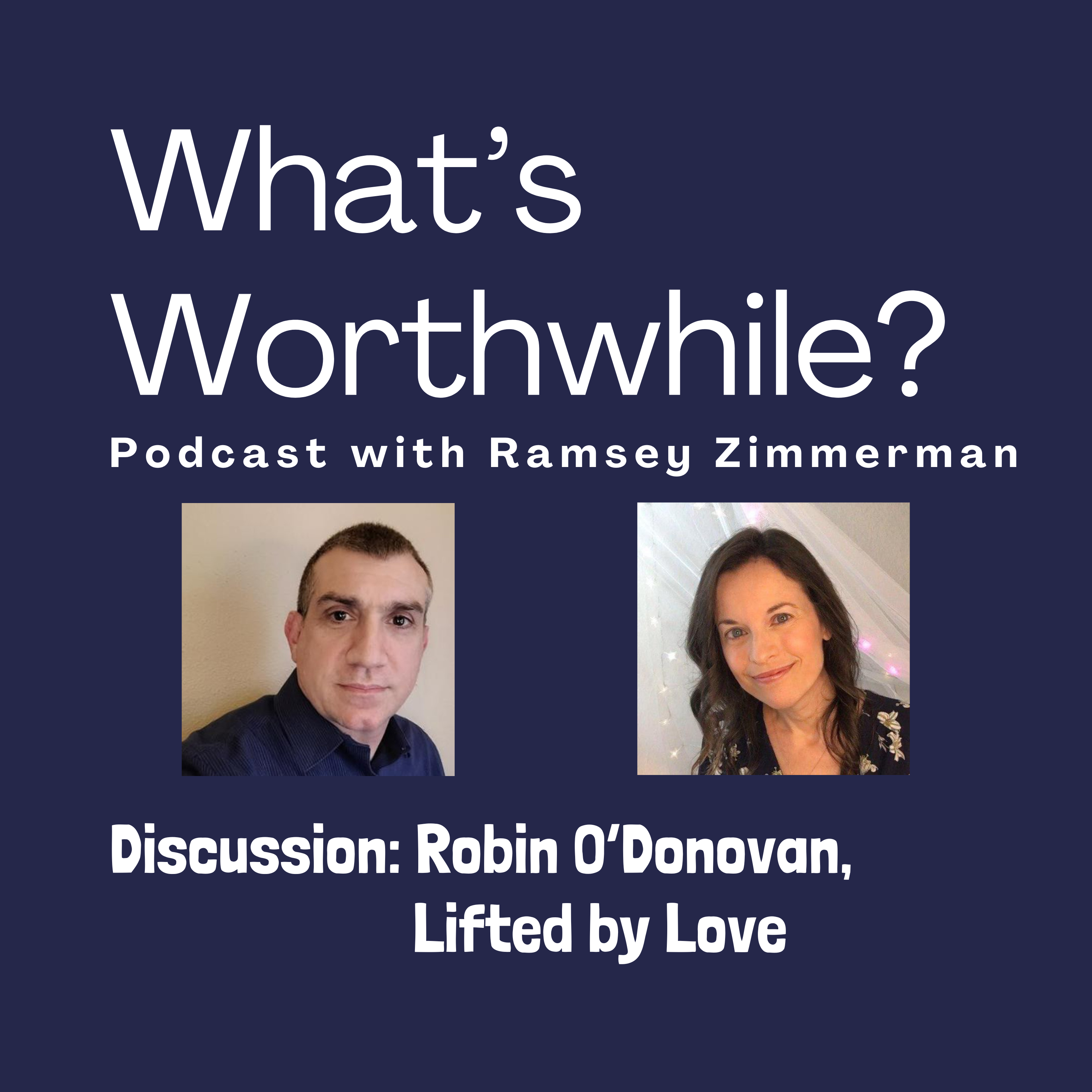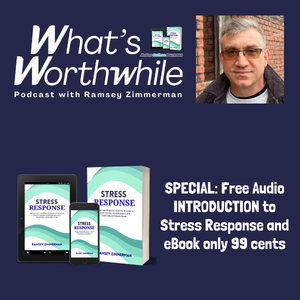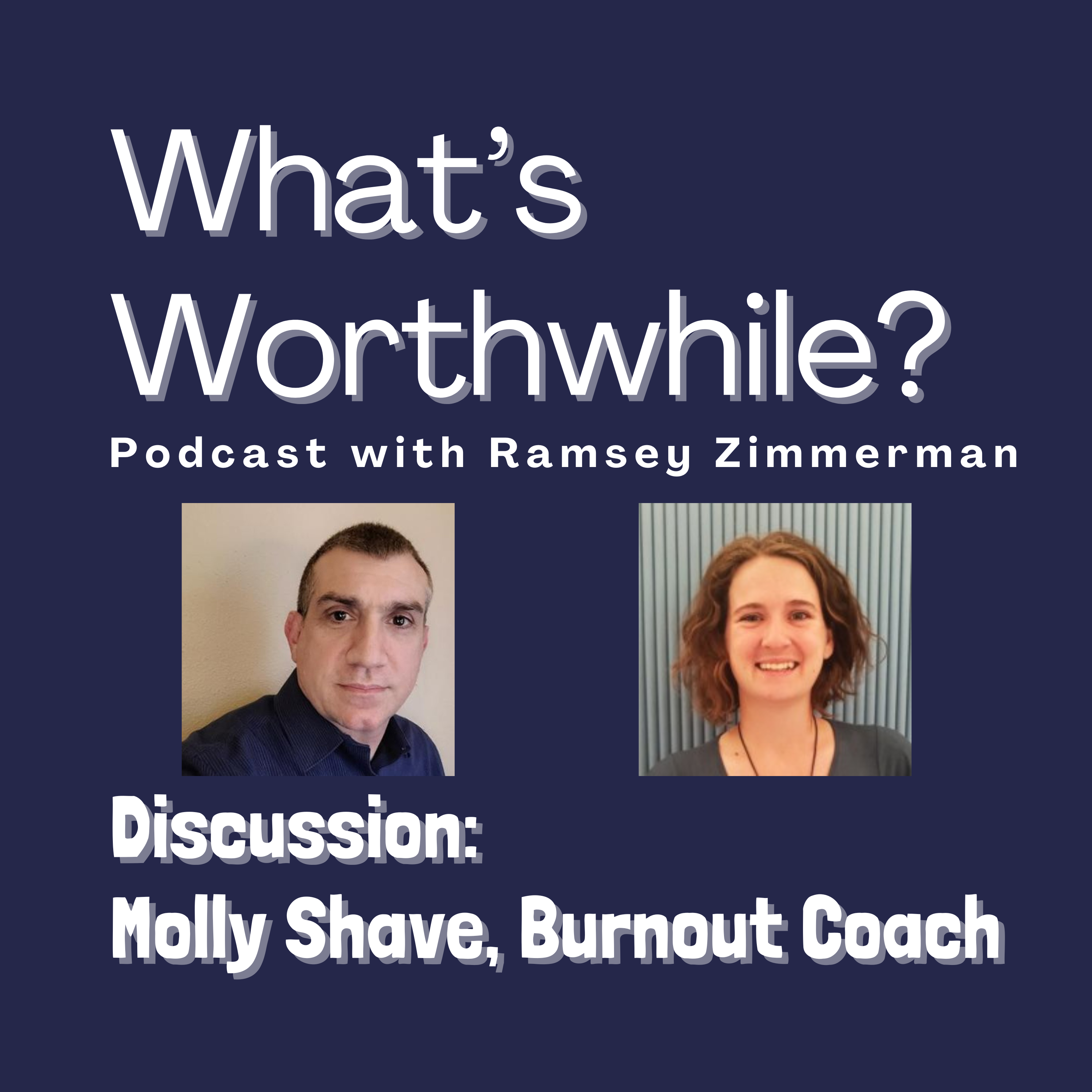[00:00:11] Speaker A: What's worthwhile?
[00:00:12] Speaker B: It's a question we all need to answer for ourselves.
[00:00:15] Speaker A: I'm Ramsay Zimmerman.
[00:00:17] Speaker B: As for me, it's building mind, body and spirit wellness. Let's ponder the big questions together as we seek peace of mind, vitality of body, and joy of spirit.
[00:00:38] Speaker A: Hey there, it's Ramsey here. I want to talk today about a great book I read recently called good energy by Casey and Callie means. This book hit home for me like dead center direct hit. Good energy boils down some very complicated and interconnected biological processes into one very simple idea, seeking good energy versus bad energy. We're talking about the kind of energy that our bodies make to keep us going throughout the day. The authors define good energy as when our cells mitochondria are functioning well and correctly versus bad energy when our cells are underpowered and struggling. I've been an energy guy for a long time. I worked in the energy efficiency and renewable energy space for almost 30 years, so energy production and use is something that I can picture and understand. I also vibe with the notion of good versus bad. I'm a total marvel superhero nerd. Just ask my kids. There are nuances with good versus bad in these stories. Many times the bad characters believe they are doing good, or other people enable them out of a misguided sense that they are doing good. Kind of like radical diets or lifestyles or indiscriminate meds that we think are good for us but are actually not. Maybe most importantly, ive probably struggled with bad energy my whole life. I was diagnosed as a kid with hypoglycemia or low blood sugar. Ive managed it by eating protein throughout the day and trying to limit the number of carbs I ate. But before reading this book I had no idea just how much blood sugar impacted the body. I find myself now rethinking what and when im going to eat on the daily.
Alright, let's get into it. What do the authors mean by good energy? Without going into organic chemistry? What I understand is that our bodies take what we eat, they break it down into its molecules and they use the energy released to fuel our cells. The right molecules and the appropriate amounts are great. The wrong molecules or too much or not enough, or at the wrong times, not so great. When this process is working well, we get good energy and we feel well. But when this process is not going well, we have bad energy and develop all kinds of problems. Too much or too little or the wrong kind of metabolic fuel messes things up. Our cells send off the same warning signals as when they are sick or being invaded by pathogens. So we have inflammation and immune responses. When there is more sugar in the blood than the body needs to operate, it gets converted to fat and triglycerides that clog up our arteries, cells and organs. This leads to high blood pressure and heart disease and strokes. With bad energy, we feel fatigue and depression and joint pain and don't want to move around or exercise as much, which only makes everything worse, of course. So what causes bad energy? It's not just that we eat the wrong percentages of protein versus fat versus carbs. The authors contend that it is also because of exposure to chemicals that didn't exist 100 years ago, but now are everywhere in modern life, things like microplastics and food additives. Our bodies don't really know what to do with these chemicals. Further, the compounds that our bodies do need, like vitamins and minerals, are in much shorter supply. When we eat processed food, fast food, junk food, we get tons of calories, lots of chemicals, and not enough nutrients, vitamins and minerals. Then our bodies struggle with processing that wrong stuff in the absence of getting the right stuff. And there's one more irony, which is that the unprocessed fruits and vegetables available at the grocery store are not even that great because the soil they grew in likely didn't have as many vitamins and minerals as it used to, and the crops likely had pesticides and fertilizers and plastic wrap on it. Yikes. What do we do? How do we treat the causes of the things that make us feel lousy and sick all the time? According to the authors, going to the doctor probably wont help much. Look, I dont want to overstate it, and the authors dont either. They are not telling people to stay away from doctors. But as a doctor herself, Casey means has a lot to say about conventional medicine. Mostly that conventional western medicine is very good at treating traumas like broken bones, but lousy at addressing chronic illness. Why? The medical system is an industry, and it makes money by providing services which are either running diagnostic equipment like mris, performing surgeries, or prescribing and providing medicines. The business model is built around people taking drugs, and if they take these drugs for the rest of their lives, then they are lifetime customers. It may be pessimistic, but think about it. Why cure or prevent conditions that can be profitably treated for years or decades? The authors very eloquently describe how doctors are driven to prescribe meds and measured by how many meds they provide and how they are mocked by supervisors for recommending diet or lifestyle changes to their patients over surgical or pharmaceutical interventions. As a result of this perverse system of incentives, our health and wellness suffers. The symptoms of our body's problems are addressed, but the causes of the problems are not addressed or corrected. We add more chemicals in the form of pharmaceuticals to our diets without adding the vitamins and minerals and nutrients that our bodies actually need. Getting back to good versus bad and superheroes the healthcare system, and doctors specifically, are heroes of our society. Doctors and nurses work long hours under enormous stress and enter the profession in order to help people. I think they deserve the hero title, but are they making the best impact? Are they healthy themselves? Even doctors and other healthcare workers suffer from bad energy as much or worse than anyone. They don't get enough rest. They eat processed food. They're exposed to chemicals indoors all day, every day. They have some of the highest rates of burnout and suicide of any profession in America. So please don't get me wrong. The last thing I want to do is vilify doctors. They are heroes, misled and trapped in a system that seems to serve corporate profits over patients well being. Where does that leave us? What can we actually do for ourselves, our families, our clients, our patients to make good energy and feel better? You know, this podcast is called what's worthwhile, and it's been a journey for me, and I've arrived at the goals of building vitality of body, peace of mind, and joy of spirit. Happily, generating good energy falls right in line with all of those in terms of vitality of body. Things like sufficient regular sleep, eating organic, unprocessed whole foods, and getting outdoor exercise are keys to good energy production. It takes some effort to do these things, but the investment pays off. The last third of the book details dietary and lifestyle answers to create good energy. Please read it. Although the book good energy focuses mostly on the physical, I do see connections to mental and spiritual health. As we cast off the cognitive dissonance of treating the symptoms of conditions with chemicals instead of curing the root causes of those conditions, our minds come back into alignment of the right goals. As we connect with others about living truly healthy, energetic lives, our spirits soar with joy. Like I said, I've been an energy guy for decades, but I feel like this book has opened my eyes to a whole new kind of energy. Life energy. Even though I don't fully understand it, I'm inspired by it, and for today, that is enough.
Thank you for asking.
[00:08:45] Speaker B: What's worthwhile? Visit whatsworthwild.net to learn more about me Ramsay Zimmerman and please provide your name and email to become a supporter. I'm asking for prayer, advice, feedback and connections. The what's worthwhile podcast is on Spotify, Apple, iHeart, and Amazon. You can also
[email protected] thanks.


